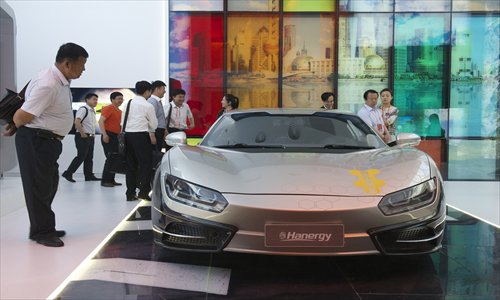Europe ‘still bright’ for Hanergy
HK probe led to end of IKEA partnership: experts

A solar car on show at Hanergy's headquarters in Beijing in May 2015 Photo: CFP
Hanergy Thin Film Power Group, a leading solar equipment manufacturer in China, said on Sunday that it would retain access to the European market even though its partnership with Sweden-based furniture giant IKEA Group has ended.
In a statement sent to the Global Times, Hanergy said that its partnership with IKEA ended on November 1, but it would continue to offer solar power products and expand its business in Europe.
Hanergy, which is under investigation by Hong Kong regulators, said in the statement that it gained thousands of customers in Europe through the partnership with IKEA, but both parties mutually decided to not renew the contract in order to "seek more beneficial cooperation models".
Hanergy signed a deal with IKEA in 2012 under which Hanergy would install rooftop solar panels for IKEA stores in China and IKEA would sell thin-film solar panels for residential use in its stores in the UK, the Netherlands and Switzerland, according to the information sent to the Global Times on Sunday by Hanergy.
Though Hanergy made no mention of any investigation by Hong Kong stock market regulators in the statement, experts suggested that the probe was the main reason IKEA had declined to renew the partnership with Hanergy.
Shen Fuxin, secretary-general of the Zhejiang Solar Energy Industry Association, told the Global Times Sunday that the contract was not a "major loss" for Hanergy, but the termination of the agreement showed the investigation had caused difficulties for the company.
Hanergy suspended trading of its shares after the price dropped by 47 percent on May 20, chairman of the parent company Hanergy Holding Group Li Hejun said on September 29, according to a post on the company's website. The suspension remained in effect as of Sunday.
The Hong Kong Securities and Futures Commission (SFC) launched an investigation into Hanergy, according to a statement on the SFC's website on May 28. The SFC hasn't provided further details about the probe, but media reports have suggested that the company was investigated for alleged related-party transactions.
Li admitted in the post that Hanergy had engaged in the transactions but said they were "no longer relevant" because the parent company was initially a client of the company. He also pointed out other issues at Hanergy, including a complex structure and absence of transparency, and called for reforms.
Shen said the investigation had a significant impact on Hanergy and created uncertainty about the company's future. "A new business model is necessary for the company," Shen noted.
Lin Boqiang, director of the Center for Energy Economics Research at Xiamen University, agreed, adding that such an investigation would shake the confidence of investors and business partners in the company and create obstacles to the company's growth.
But the top priority now was for Hanergy to "handle" the investigation to enable the company to move forward in the solar energy business, which has immense growth potential, Lin said.
Although it faces challenges due to the investigation and a slow-growing solar energy market, Hanergy could still be successful in the long run if it continued to innovate and bring new products to the market, Lin added.
Those products could include solar-powered cars, which Hanergy has announced plans to develop. A concept model of the Hanergy SolarPower vehicle made its debut at an event in Beijing on October 19, according to a post on the company's website last month. But experts said it would take some time before the car could go into production.